Barriers and Facilitators: Mental Health of Humanitarian Aid Workers
VerifiedAdded on 2022/08/16
|10
|2638
|11
Project
AI Summary
This research proposal examines the mental health of humanitarian aid workers, focusing on the barriers to implementing mental health strategies within their organizations. The study aims to explore the stressors, psychological factors, and occupational risks faced by aid workers globally. It investigates organizational policies regarding mental health support, including the potential benefits of mindfulness training. The methodology includes qualitative methods such as interviews, surveys, and focus groups to gather data from aid workers and HR managers. The research seeks to identify gaps in current practices, inform policy changes, and promote interventions to improve the wellbeing of humanitarian aid workers. The project includes a detailed timeline and ethical considerations for data collection and dissemination, aiming to contribute to a healthier and more supportive work environment for those involved in humanitarian aid.
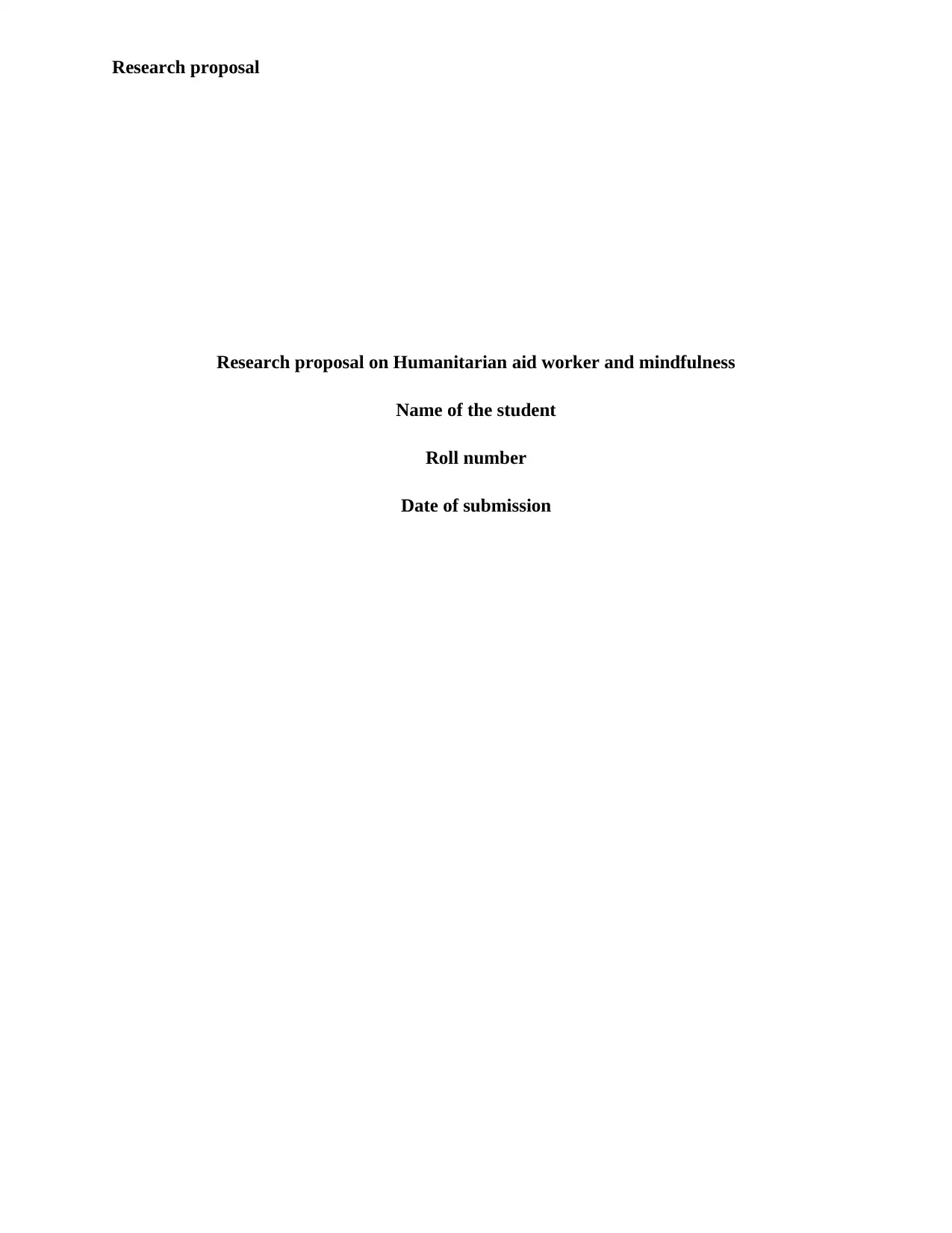
Research proposal
Research proposal on Humanitarian aid worker and mindfulness
Name of the student
Roll number
Date of submission
Research proposal on Humanitarian aid worker and mindfulness
Name of the student
Roll number
Date of submission
Paraphrase This Document
Need a fresh take? Get an instant paraphrase of this document with our AI Paraphraser
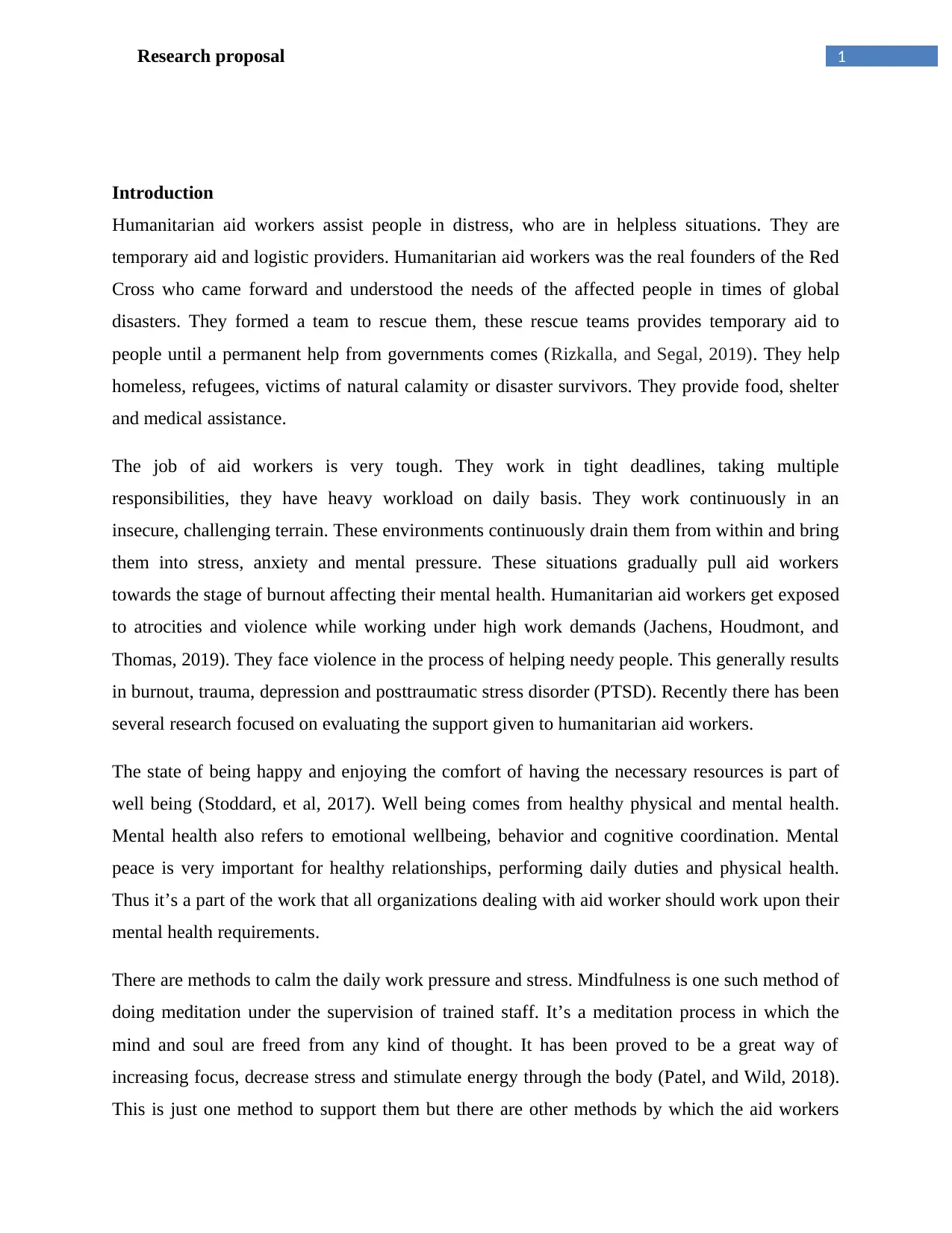
1Research proposal
Introduction
Humanitarian aid workers assist people in distress, who are in helpless situations. They are
temporary aid and logistic providers. Humanitarian aid workers was the real founders of the Red
Cross who came forward and understood the needs of the affected people in times of global
disasters. They formed a team to rescue them, these rescue teams provides temporary aid to
people until a permanent help from governments comes (Rizkalla, and Segal, 2019). They help
homeless, refugees, victims of natural calamity or disaster survivors. They provide food, shelter
and medical assistance.
The job of aid workers is very tough. They work in tight deadlines, taking multiple
responsibilities, they have heavy workload on daily basis. They work continuously in an
insecure, challenging terrain. These environments continuously drain them from within and bring
them into stress, anxiety and mental pressure. These situations gradually pull aid workers
towards the stage of burnout affecting their mental health. Humanitarian aid workers get exposed
to atrocities and violence while working under high work demands (Jachens, Houdmont, and
Thomas, 2019). They face violence in the process of helping needy people. This generally results
in burnout, trauma, depression and posttraumatic stress disorder (PTSD). Recently there has been
several research focused on evaluating the support given to humanitarian aid workers.
The state of being happy and enjoying the comfort of having the necessary resources is part of
well being (Stoddard, et al, 2017). Well being comes from healthy physical and mental health.
Mental health also refers to emotional wellbeing, behavior and cognitive coordination. Mental
peace is very important for healthy relationships, performing daily duties and physical health.
Thus it’s a part of the work that all organizations dealing with aid worker should work upon their
mental health requirements.
There are methods to calm the daily work pressure and stress. Mindfulness is one such method of
doing meditation under the supervision of trained staff. It’s a meditation process in which the
mind and soul are freed from any kind of thought. It has been proved to be a great way of
increasing focus, decrease stress and stimulate energy through the body (Patel, and Wild, 2018).
This is just one method to support them but there are other methods by which the aid workers
Introduction
Humanitarian aid workers assist people in distress, who are in helpless situations. They are
temporary aid and logistic providers. Humanitarian aid workers was the real founders of the Red
Cross who came forward and understood the needs of the affected people in times of global
disasters. They formed a team to rescue them, these rescue teams provides temporary aid to
people until a permanent help from governments comes (Rizkalla, and Segal, 2019). They help
homeless, refugees, victims of natural calamity or disaster survivors. They provide food, shelter
and medical assistance.
The job of aid workers is very tough. They work in tight deadlines, taking multiple
responsibilities, they have heavy workload on daily basis. They work continuously in an
insecure, challenging terrain. These environments continuously drain them from within and bring
them into stress, anxiety and mental pressure. These situations gradually pull aid workers
towards the stage of burnout affecting their mental health. Humanitarian aid workers get exposed
to atrocities and violence while working under high work demands (Jachens, Houdmont, and
Thomas, 2019). They face violence in the process of helping needy people. This generally results
in burnout, trauma, depression and posttraumatic stress disorder (PTSD). Recently there has been
several research focused on evaluating the support given to humanitarian aid workers.
The state of being happy and enjoying the comfort of having the necessary resources is part of
well being (Stoddard, et al, 2017). Well being comes from healthy physical and mental health.
Mental health also refers to emotional wellbeing, behavior and cognitive coordination. Mental
peace is very important for healthy relationships, performing daily duties and physical health.
Thus it’s a part of the work that all organizations dealing with aid worker should work upon their
mental health requirements.
There are methods to calm the daily work pressure and stress. Mindfulness is one such method of
doing meditation under the supervision of trained staff. It’s a meditation process in which the
mind and soul are freed from any kind of thought. It has been proved to be a great way of
increasing focus, decrease stress and stimulate energy through the body (Patel, and Wild, 2018).
This is just one method to support them but there are other methods by which the aid workers
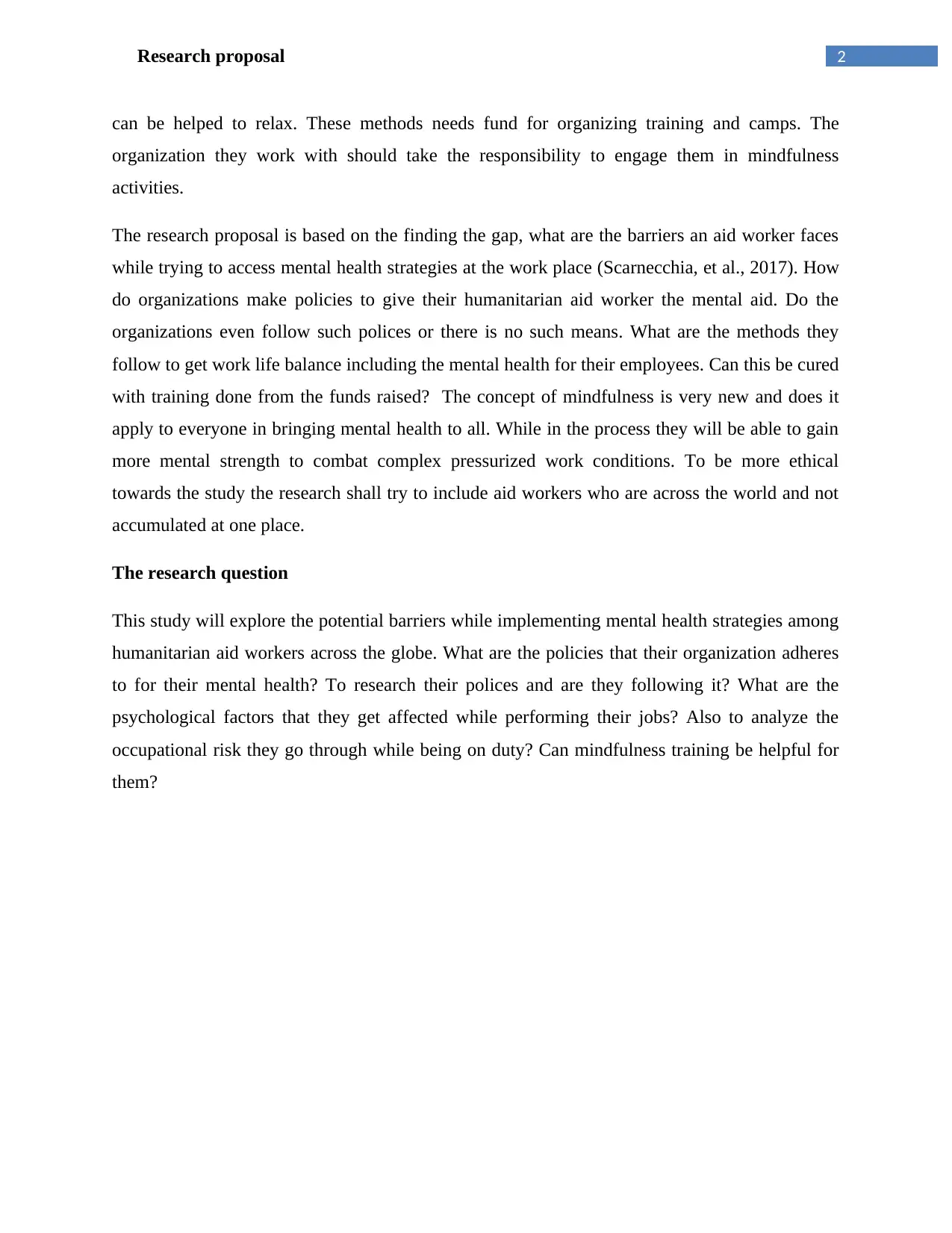
2Research proposal
can be helped to relax. These methods needs fund for organizing training and camps. The
organization they work with should take the responsibility to engage them in mindfulness
activities.
The research proposal is based on the finding the gap, what are the barriers an aid worker faces
while trying to access mental health strategies at the work place (Scarnecchia, et al., 2017). How
do organizations make policies to give their humanitarian aid worker the mental aid. Do the
organizations even follow such polices or there is no such means. What are the methods they
follow to get work life balance including the mental health for their employees. Can this be cured
with training done from the funds raised? The concept of mindfulness is very new and does it
apply to everyone in bringing mental health to all. While in the process they will be able to gain
more mental strength to combat complex pressurized work conditions. To be more ethical
towards the study the research shall try to include aid workers who are across the world and not
accumulated at one place.
The research question
This study will explore the potential barriers while implementing mental health strategies among
humanitarian aid workers across the globe. What are the policies that their organization adheres
to for their mental health? To research their polices and are they following it? What are the
psychological factors that they get affected while performing their jobs? Also to analyze the
occupational risk they go through while being on duty? Can mindfulness training be helpful for
them?
can be helped to relax. These methods needs fund for organizing training and camps. The
organization they work with should take the responsibility to engage them in mindfulness
activities.
The research proposal is based on the finding the gap, what are the barriers an aid worker faces
while trying to access mental health strategies at the work place (Scarnecchia, et al., 2017). How
do organizations make policies to give their humanitarian aid worker the mental aid. Do the
organizations even follow such polices or there is no such means. What are the methods they
follow to get work life balance including the mental health for their employees. Can this be cured
with training done from the funds raised? The concept of mindfulness is very new and does it
apply to everyone in bringing mental health to all. While in the process they will be able to gain
more mental strength to combat complex pressurized work conditions. To be more ethical
towards the study the research shall try to include aid workers who are across the world and not
accumulated at one place.
The research question
This study will explore the potential barriers while implementing mental health strategies among
humanitarian aid workers across the globe. What are the policies that their organization adheres
to for their mental health? To research their polices and are they following it? What are the
psychological factors that they get affected while performing their jobs? Also to analyze the
occupational risk they go through while being on duty? Can mindfulness training be helpful for
them?
⊘ This is a preview!⊘
Do you want full access?
Subscribe today to unlock all pages.

Trusted by 1+ million students worldwide
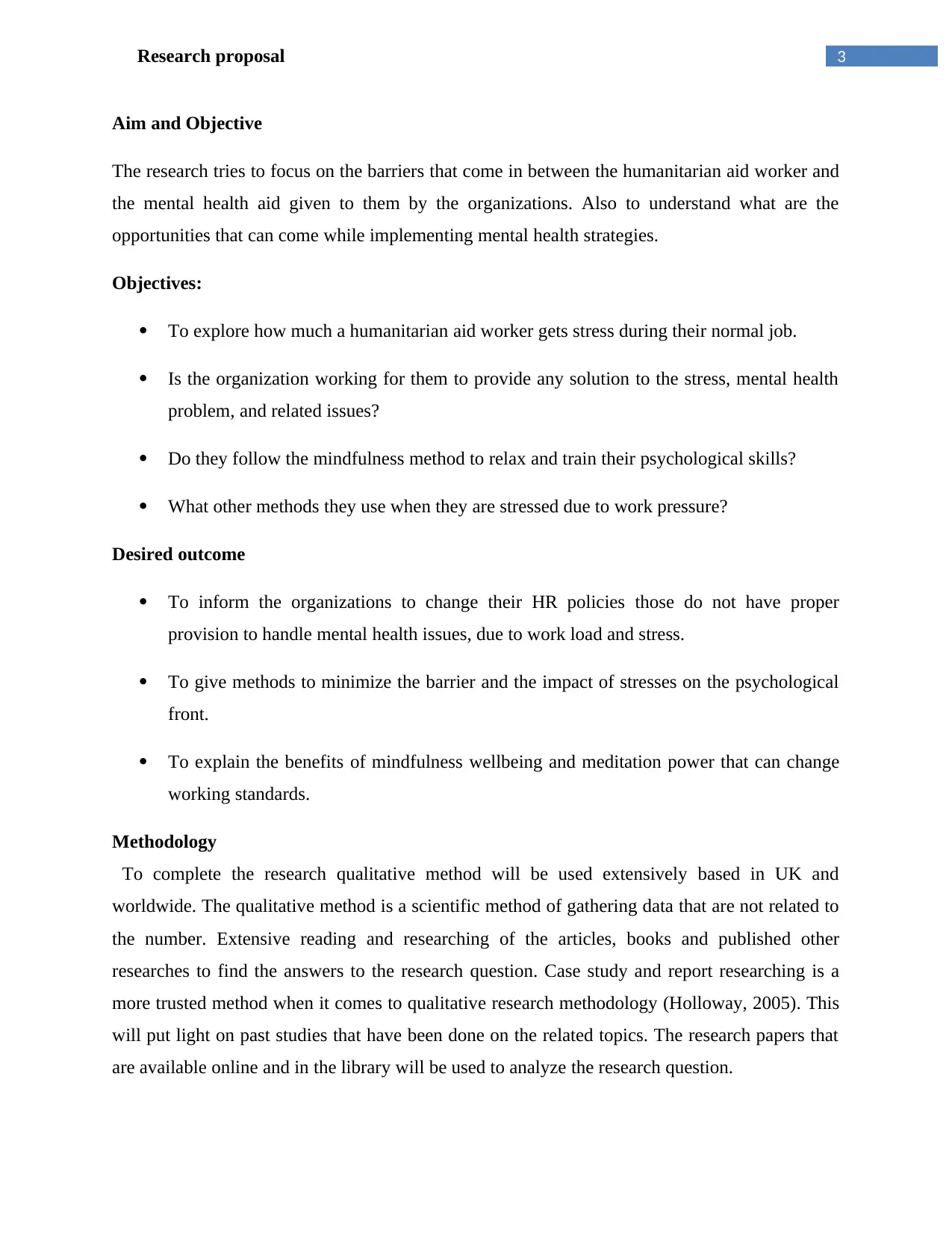
3Research proposal
Aim and Objective
The research tries to focus on the barriers that come in between the humanitarian aid worker and
the mental health aid given to them by the organizations. Also to understand what are the
opportunities that can come while implementing mental health strategies.
Objectives:
To explore how much a humanitarian aid worker gets stress during their normal job.
Is the organization working for them to provide any solution to the stress, mental health
problem, and related issues?
Do they follow the mindfulness method to relax and train their psychological skills?
What other methods they use when they are stressed due to work pressure?
Desired outcome
To inform the organizations to change their HR policies those do not have proper
provision to handle mental health issues, due to work load and stress.
To give methods to minimize the barrier and the impact of stresses on the psychological
front.
To explain the benefits of mindfulness wellbeing and meditation power that can change
working standards.
Methodology
To complete the research qualitative method will be used extensively based in UK and
worldwide. The qualitative method is a scientific method of gathering data that are not related to
the number. Extensive reading and researching of the articles, books and published other
researches to find the answers to the research question. Case study and report researching is a
more trusted method when it comes to qualitative research methodology (Holloway, 2005). This
will put light on past studies that have been done on the related topics. The research papers that
are available online and in the library will be used to analyze the research question.
Aim and Objective
The research tries to focus on the barriers that come in between the humanitarian aid worker and
the mental health aid given to them by the organizations. Also to understand what are the
opportunities that can come while implementing mental health strategies.
Objectives:
To explore how much a humanitarian aid worker gets stress during their normal job.
Is the organization working for them to provide any solution to the stress, mental health
problem, and related issues?
Do they follow the mindfulness method to relax and train their psychological skills?
What other methods they use when they are stressed due to work pressure?
Desired outcome
To inform the organizations to change their HR policies those do not have proper
provision to handle mental health issues, due to work load and stress.
To give methods to minimize the barrier and the impact of stresses on the psychological
front.
To explain the benefits of mindfulness wellbeing and meditation power that can change
working standards.
Methodology
To complete the research qualitative method will be used extensively based in UK and
worldwide. The qualitative method is a scientific method of gathering data that are not related to
the number. Extensive reading and researching of the articles, books and published other
researches to find the answers to the research question. Case study and report researching is a
more trusted method when it comes to qualitative research methodology (Holloway, 2005). This
will put light on past studies that have been done on the related topics. The research papers that
are available online and in the library will be used to analyze the research question.
Paraphrase This Document
Need a fresh take? Get an instant paraphrase of this document with our AI Paraphraser
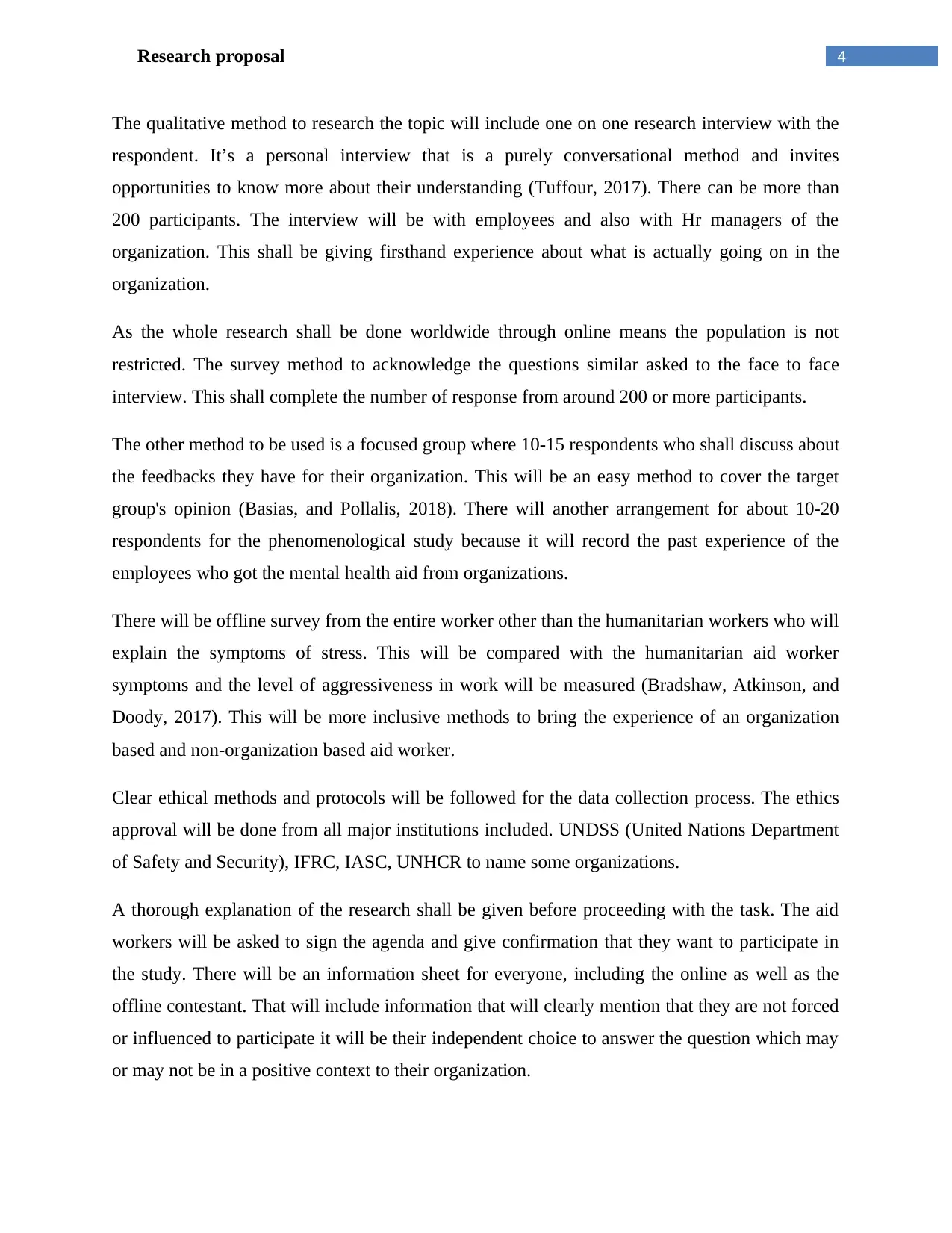
4Research proposal
The qualitative method to research the topic will include one on one research interview with the
respondent. It’s a personal interview that is a purely conversational method and invites
opportunities to know more about their understanding (Tuffour, 2017). There can be more than
200 participants. The interview will be with employees and also with Hr managers of the
organization. This shall be giving firsthand experience about what is actually going on in the
organization.
As the whole research shall be done worldwide through online means the population is not
restricted. The survey method to acknowledge the questions similar asked to the face to face
interview. This shall complete the number of response from around 200 or more participants.
The other method to be used is a focused group where 10-15 respondents who shall discuss about
the feedbacks they have for their organization. This will be an easy method to cover the target
group's opinion (Basias, and Pollalis, 2018). There will another arrangement for about 10-20
respondents for the phenomenological study because it will record the past experience of the
employees who got the mental health aid from organizations.
There will be offline survey from the entire worker other than the humanitarian workers who will
explain the symptoms of stress. This will be compared with the humanitarian aid worker
symptoms and the level of aggressiveness in work will be measured (Bradshaw, Atkinson, and
Doody, 2017). This will be more inclusive methods to bring the experience of an organization
based and non-organization based aid worker.
Clear ethical methods and protocols will be followed for the data collection process. The ethics
approval will be done from all major institutions included. UNDSS (United Nations Department
of Safety and Security), IFRC, IASC, UNHCR to name some organizations.
A thorough explanation of the research shall be given before proceeding with the task. The aid
workers will be asked to sign the agenda and give confirmation that they want to participate in
the study. There will be an information sheet for everyone, including the online as well as the
offline contestant. That will include information that will clearly mention that they are not forced
or influenced to participate it will be their independent choice to answer the question which may
or may not be in a positive context to their organization.
The qualitative method to research the topic will include one on one research interview with the
respondent. It’s a personal interview that is a purely conversational method and invites
opportunities to know more about their understanding (Tuffour, 2017). There can be more than
200 participants. The interview will be with employees and also with Hr managers of the
organization. This shall be giving firsthand experience about what is actually going on in the
organization.
As the whole research shall be done worldwide through online means the population is not
restricted. The survey method to acknowledge the questions similar asked to the face to face
interview. This shall complete the number of response from around 200 or more participants.
The other method to be used is a focused group where 10-15 respondents who shall discuss about
the feedbacks they have for their organization. This will be an easy method to cover the target
group's opinion (Basias, and Pollalis, 2018). There will another arrangement for about 10-20
respondents for the phenomenological study because it will record the past experience of the
employees who got the mental health aid from organizations.
There will be offline survey from the entire worker other than the humanitarian workers who will
explain the symptoms of stress. This will be compared with the humanitarian aid worker
symptoms and the level of aggressiveness in work will be measured (Bradshaw, Atkinson, and
Doody, 2017). This will be more inclusive methods to bring the experience of an organization
based and non-organization based aid worker.
Clear ethical methods and protocols will be followed for the data collection process. The ethics
approval will be done from all major institutions included. UNDSS (United Nations Department
of Safety and Security), IFRC, IASC, UNHCR to name some organizations.
A thorough explanation of the research shall be given before proceeding with the task. The aid
workers will be asked to sign the agenda and give confirmation that they want to participate in
the study. There will be an information sheet for everyone, including the online as well as the
offline contestant. That will include information that will clearly mention that they are not forced
or influenced to participate it will be their independent choice to answer the question which may
or may not be in a positive context to their organization.
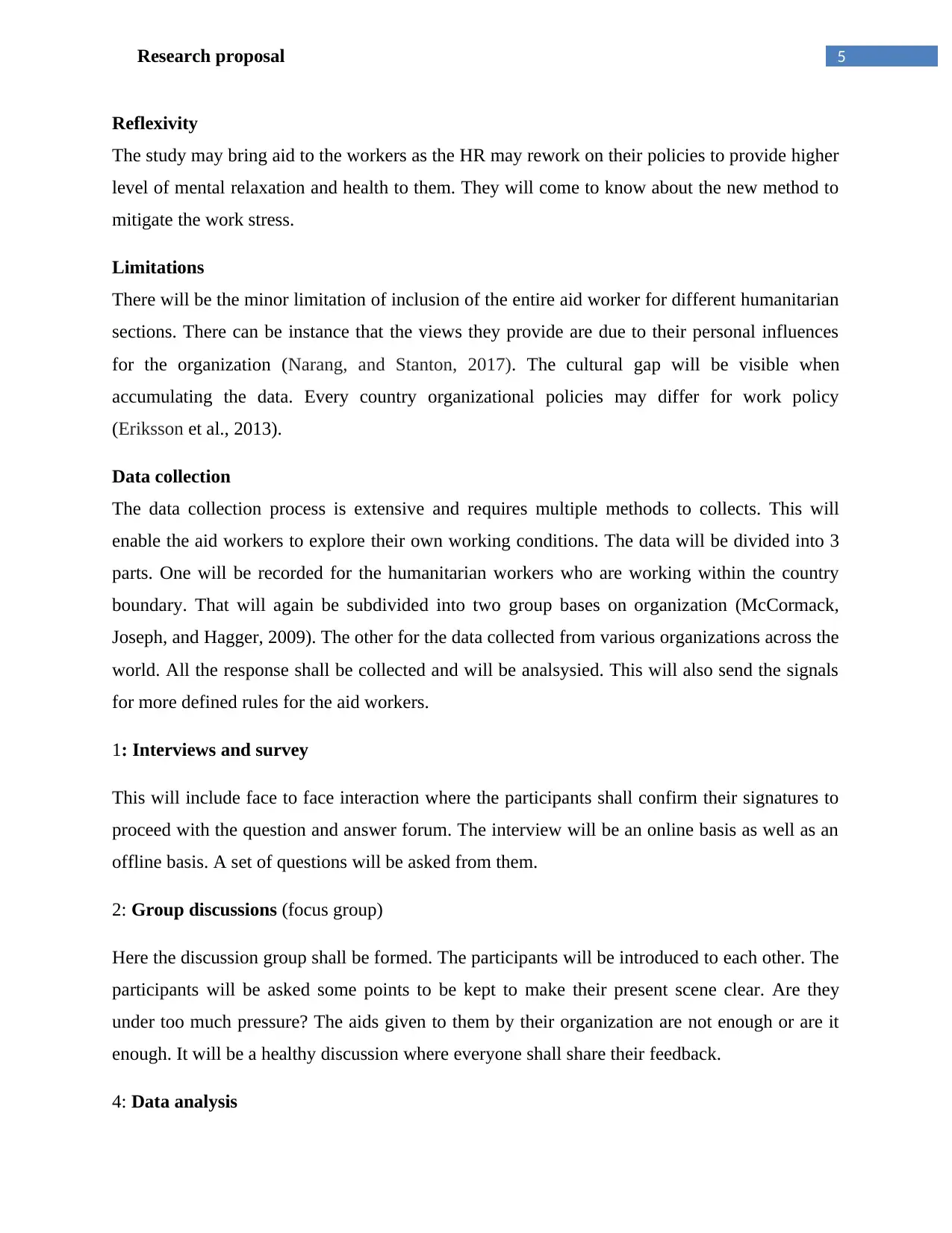
5Research proposal
Reflexivity
The study may bring aid to the workers as the HR may rework on their policies to provide higher
level of mental relaxation and health to them. They will come to know about the new method to
mitigate the work stress.
Limitations
There will be the minor limitation of inclusion of the entire aid worker for different humanitarian
sections. There can be instance that the views they provide are due to their personal influences
for the organization (Narang, and Stanton, 2017). The cultural gap will be visible when
accumulating the data. Every country organizational policies may differ for work policy
(Eriksson et al., 2013).
Data collection
The data collection process is extensive and requires multiple methods to collects. This will
enable the aid workers to explore their own working conditions. The data will be divided into 3
parts. One will be recorded for the humanitarian workers who are working within the country
boundary. That will again be subdivided into two group bases on organization (McCormack,
Joseph, and Hagger, 2009). The other for the data collected from various organizations across the
world. All the response shall be collected and will be analsysied. This will also send the signals
for more defined rules for the aid workers.
1: Interviews and survey
This will include face to face interaction where the participants shall confirm their signatures to
proceed with the question and answer forum. The interview will be an online basis as well as an
offline basis. A set of questions will be asked from them.
2: Group discussions (focus group)
Here the discussion group shall be formed. The participants will be introduced to each other. The
participants will be asked some points to be kept to make their present scene clear. Are they
under too much pressure? The aids given to them by their organization are not enough or are it
enough. It will be a healthy discussion where everyone shall share their feedback.
4: Data analysis
Reflexivity
The study may bring aid to the workers as the HR may rework on their policies to provide higher
level of mental relaxation and health to them. They will come to know about the new method to
mitigate the work stress.
Limitations
There will be the minor limitation of inclusion of the entire aid worker for different humanitarian
sections. There can be instance that the views they provide are due to their personal influences
for the organization (Narang, and Stanton, 2017). The cultural gap will be visible when
accumulating the data. Every country organizational policies may differ for work policy
(Eriksson et al., 2013).
Data collection
The data collection process is extensive and requires multiple methods to collects. This will
enable the aid workers to explore their own working conditions. The data will be divided into 3
parts. One will be recorded for the humanitarian workers who are working within the country
boundary. That will again be subdivided into two group bases on organization (McCormack,
Joseph, and Hagger, 2009). The other for the data collected from various organizations across the
world. All the response shall be collected and will be analsysied. This will also send the signals
for more defined rules for the aid workers.
1: Interviews and survey
This will include face to face interaction where the participants shall confirm their signatures to
proceed with the question and answer forum. The interview will be an online basis as well as an
offline basis. A set of questions will be asked from them.
2: Group discussions (focus group)
Here the discussion group shall be formed. The participants will be introduced to each other. The
participants will be asked some points to be kept to make their present scene clear. Are they
under too much pressure? The aids given to them by their organization are not enough or are it
enough. It will be a healthy discussion where everyone shall share their feedback.
4: Data analysis
⊘ This is a preview!⊘
Do you want full access?
Subscribe today to unlock all pages.

Trusted by 1+ million students worldwide
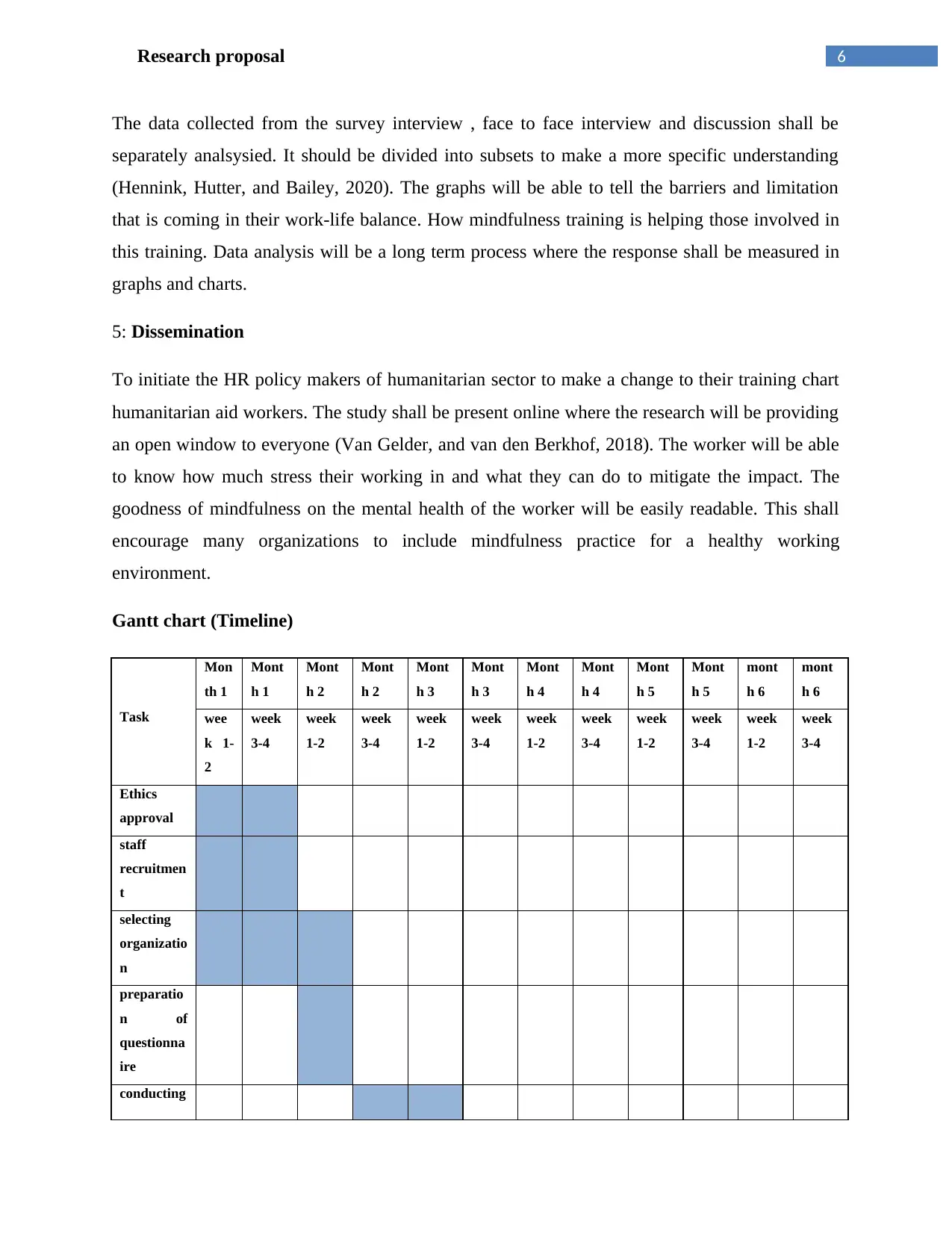
6Research proposal
The data collected from the survey interview , face to face interview and discussion shall be
separately analsysied. It should be divided into subsets to make a more specific understanding
(Hennink, Hutter, and Bailey, 2020). The graphs will be able to tell the barriers and limitation
that is coming in their work-life balance. How mindfulness training is helping those involved in
this training. Data analysis will be a long term process where the response shall be measured in
graphs and charts.
5: Dissemination
To initiate the HR policy makers of humanitarian sector to make a change to their training chart
humanitarian aid workers. The study shall be present online where the research will be providing
an open window to everyone (Van Gelder, and van den Berkhof, 2018). The worker will be able
to know how much stress their working in and what they can do to mitigate the impact. The
goodness of mindfulness on the mental health of the worker will be easily readable. This shall
encourage many organizations to include mindfulness practice for a healthy working
environment.
Gantt chart (Timeline)
Task
Mon
th 1
Mont
h 1
Mont
h 2
Mont
h 2
Mont
h 3
Mont
h 3
Mont
h 4
Mont
h 4
Mont
h 5
Mont
h 5
mont
h 6
mont
h 6
wee
k 1-
2
week
3-4
week
1-2
week
3-4
week
1-2
week
3-4
week
1-2
week
3-4
week
1-2
week
3-4
week
1-2
week
3-4
Ethics
approval
staff
recruitmen
t
selecting
organizatio
n
preparatio
n of
questionna
ire
conducting
The data collected from the survey interview , face to face interview and discussion shall be
separately analsysied. It should be divided into subsets to make a more specific understanding
(Hennink, Hutter, and Bailey, 2020). The graphs will be able to tell the barriers and limitation
that is coming in their work-life balance. How mindfulness training is helping those involved in
this training. Data analysis will be a long term process where the response shall be measured in
graphs and charts.
5: Dissemination
To initiate the HR policy makers of humanitarian sector to make a change to their training chart
humanitarian aid workers. The study shall be present online where the research will be providing
an open window to everyone (Van Gelder, and van den Berkhof, 2018). The worker will be able
to know how much stress their working in and what they can do to mitigate the impact. The
goodness of mindfulness on the mental health of the worker will be easily readable. This shall
encourage many organizations to include mindfulness practice for a healthy working
environment.
Gantt chart (Timeline)
Task
Mon
th 1
Mont
h 1
Mont
h 2
Mont
h 2
Mont
h 3
Mont
h 3
Mont
h 4
Mont
h 4
Mont
h 5
Mont
h 5
mont
h 6
mont
h 6
wee
k 1-
2
week
3-4
week
1-2
week
3-4
week
1-2
week
3-4
week
1-2
week
3-4
week
1-2
week
3-4
week
1-2
week
3-4
Ethics
approval
staff
recruitmen
t
selecting
organizatio
n
preparatio
n of
questionna
ire
conducting
Paraphrase This Document
Need a fresh take? Get an instant paraphrase of this document with our AI Paraphraser
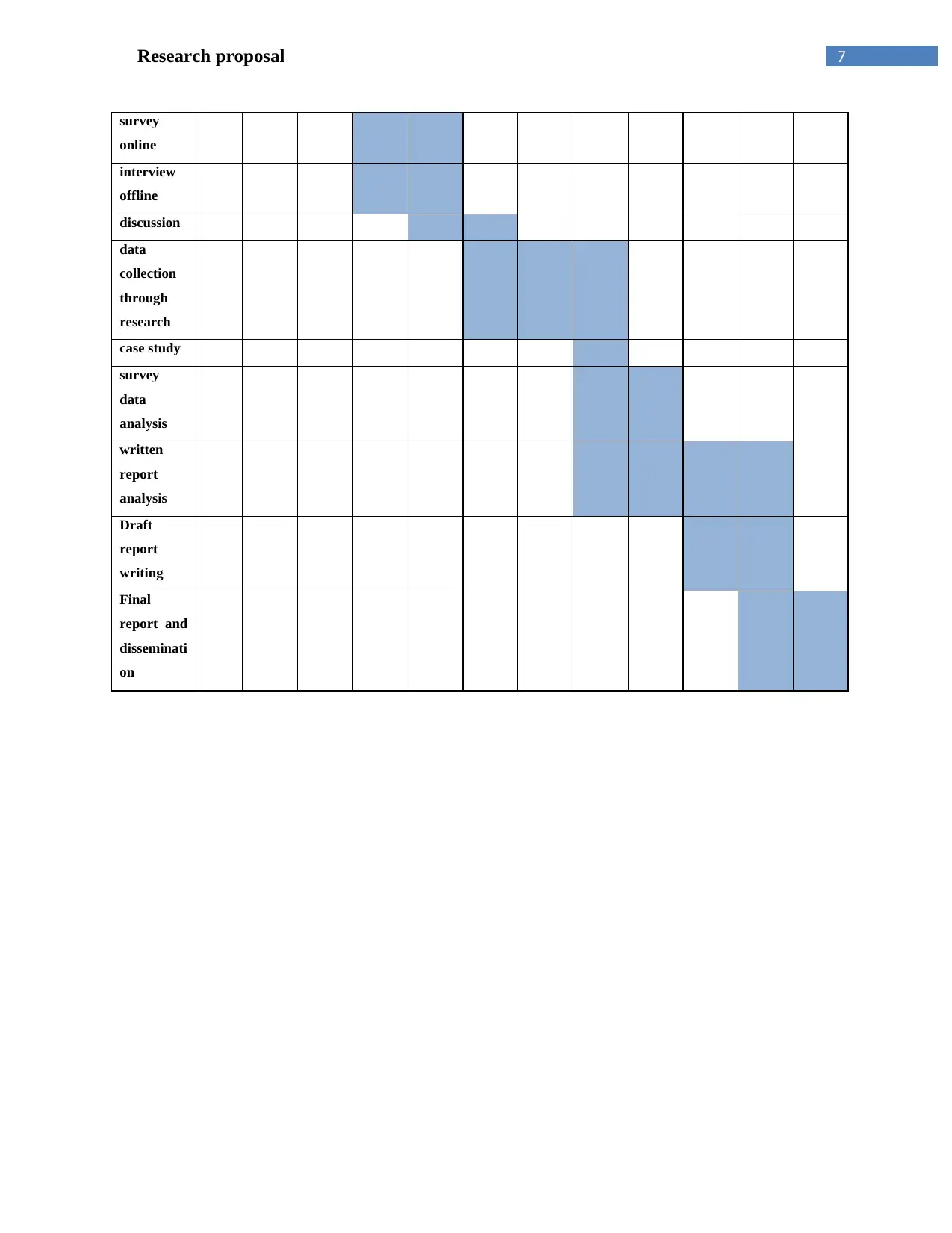
7Research proposal
survey
online
interview
offline
discussion
data
collection
through
research
case study
survey
data
analysis
written
report
analysis
Draft
report
writing
Final
report and
disseminati
on
survey
online
interview
offline
discussion
data
collection
through
research
case study
survey
data
analysis
written
report
analysis
Draft
report
writing
Final
report and
disseminati
on
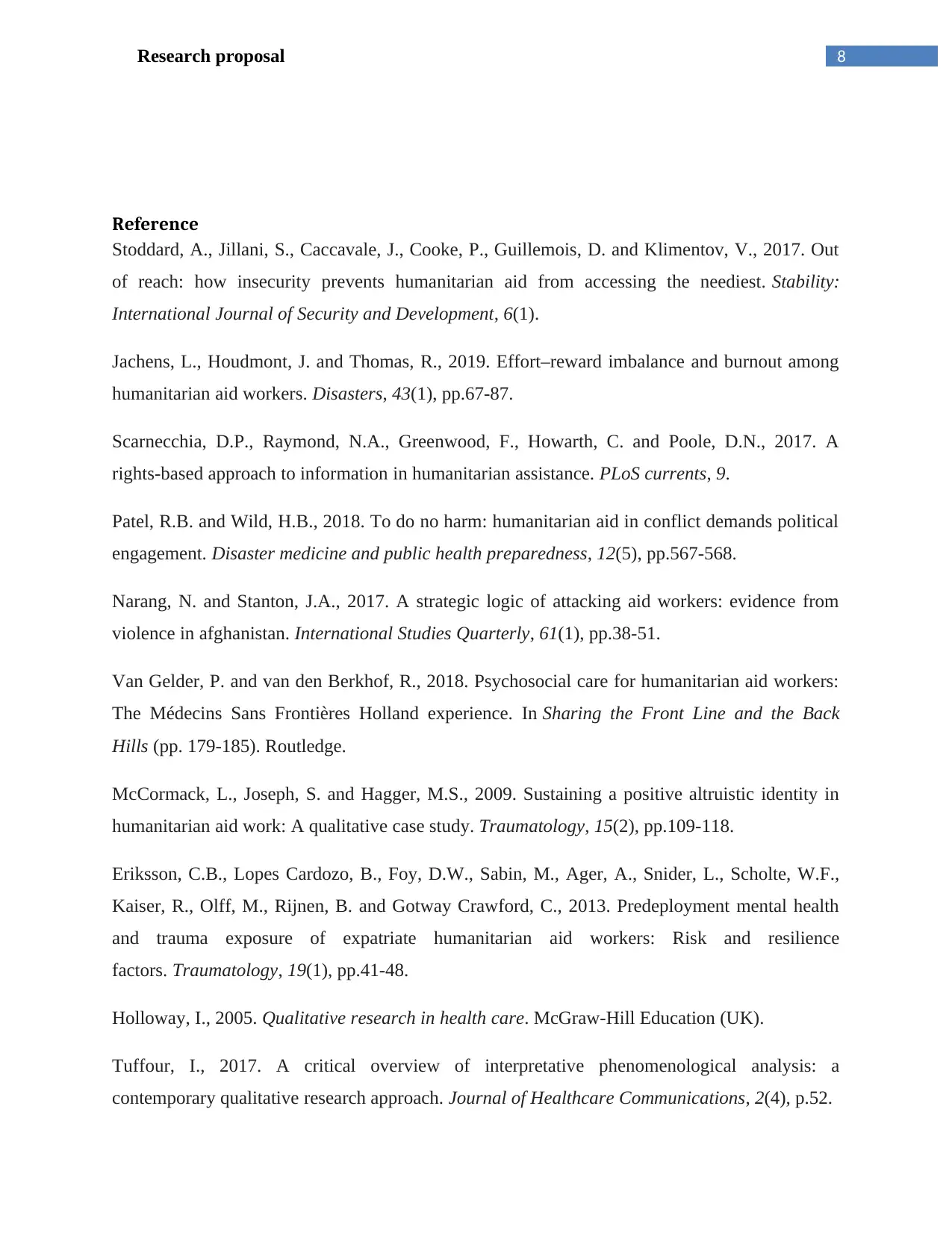
8Research proposal
Reference
Stoddard, A., Jillani, S., Caccavale, J., Cooke, P., Guillemois, D. and Klimentov, V., 2017. Out
of reach: how insecurity prevents humanitarian aid from accessing the neediest. Stability:
International Journal of Security and Development, 6(1).
Jachens, L., Houdmont, J. and Thomas, R., 2019. Effort–reward imbalance and burnout among
humanitarian aid workers. Disasters, 43(1), pp.67-87.
Scarnecchia, D.P., Raymond, N.A., Greenwood, F., Howarth, C. and Poole, D.N., 2017. A
rights-based approach to information in humanitarian assistance. PLoS currents, 9.
Patel, R.B. and Wild, H.B., 2018. To do no harm: humanitarian aid in conflict demands political
engagement. Disaster medicine and public health preparedness, 12(5), pp.567-568.
Narang, N. and Stanton, J.A., 2017. A strategic logic of attacking aid workers: evidence from
violence in afghanistan. International Studies Quarterly, 61(1), pp.38-51.
Van Gelder, P. and van den Berkhof, R., 2018. Psychosocial care for humanitarian aid workers:
The Médecins Sans Frontières Holland experience. In Sharing the Front Line and the Back
Hills (pp. 179-185). Routledge.
McCormack, L., Joseph, S. and Hagger, M.S., 2009. Sustaining a positive altruistic identity in
humanitarian aid work: A qualitative case study. Traumatology, 15(2), pp.109-118.
Eriksson, C.B., Lopes Cardozo, B., Foy, D.W., Sabin, M., Ager, A., Snider, L., Scholte, W.F.,
Kaiser, R., Olff, M., Rijnen, B. and Gotway Crawford, C., 2013. Predeployment mental health
and trauma exposure of expatriate humanitarian aid workers: Risk and resilience
factors. Traumatology, 19(1), pp.41-48.
Holloway, I., 2005. Qualitative research in health care. McGraw-Hill Education (UK).
Tuffour, I., 2017. A critical overview of interpretative phenomenological analysis: a
contemporary qualitative research approach. Journal of Healthcare Communications, 2(4), p.52.
Reference
Stoddard, A., Jillani, S., Caccavale, J., Cooke, P., Guillemois, D. and Klimentov, V., 2017. Out
of reach: how insecurity prevents humanitarian aid from accessing the neediest. Stability:
International Journal of Security and Development, 6(1).
Jachens, L., Houdmont, J. and Thomas, R., 2019. Effort–reward imbalance and burnout among
humanitarian aid workers. Disasters, 43(1), pp.67-87.
Scarnecchia, D.P., Raymond, N.A., Greenwood, F., Howarth, C. and Poole, D.N., 2017. A
rights-based approach to information in humanitarian assistance. PLoS currents, 9.
Patel, R.B. and Wild, H.B., 2018. To do no harm: humanitarian aid in conflict demands political
engagement. Disaster medicine and public health preparedness, 12(5), pp.567-568.
Narang, N. and Stanton, J.A., 2017. A strategic logic of attacking aid workers: evidence from
violence in afghanistan. International Studies Quarterly, 61(1), pp.38-51.
Van Gelder, P. and van den Berkhof, R., 2018. Psychosocial care for humanitarian aid workers:
The Médecins Sans Frontières Holland experience. In Sharing the Front Line and the Back
Hills (pp. 179-185). Routledge.
McCormack, L., Joseph, S. and Hagger, M.S., 2009. Sustaining a positive altruistic identity in
humanitarian aid work: A qualitative case study. Traumatology, 15(2), pp.109-118.
Eriksson, C.B., Lopes Cardozo, B., Foy, D.W., Sabin, M., Ager, A., Snider, L., Scholte, W.F.,
Kaiser, R., Olff, M., Rijnen, B. and Gotway Crawford, C., 2013. Predeployment mental health
and trauma exposure of expatriate humanitarian aid workers: Risk and resilience
factors. Traumatology, 19(1), pp.41-48.
Holloway, I., 2005. Qualitative research in health care. McGraw-Hill Education (UK).
Tuffour, I., 2017. A critical overview of interpretative phenomenological analysis: a
contemporary qualitative research approach. Journal of Healthcare Communications, 2(4), p.52.
⊘ This is a preview!⊘
Do you want full access?
Subscribe today to unlock all pages.

Trusted by 1+ million students worldwide
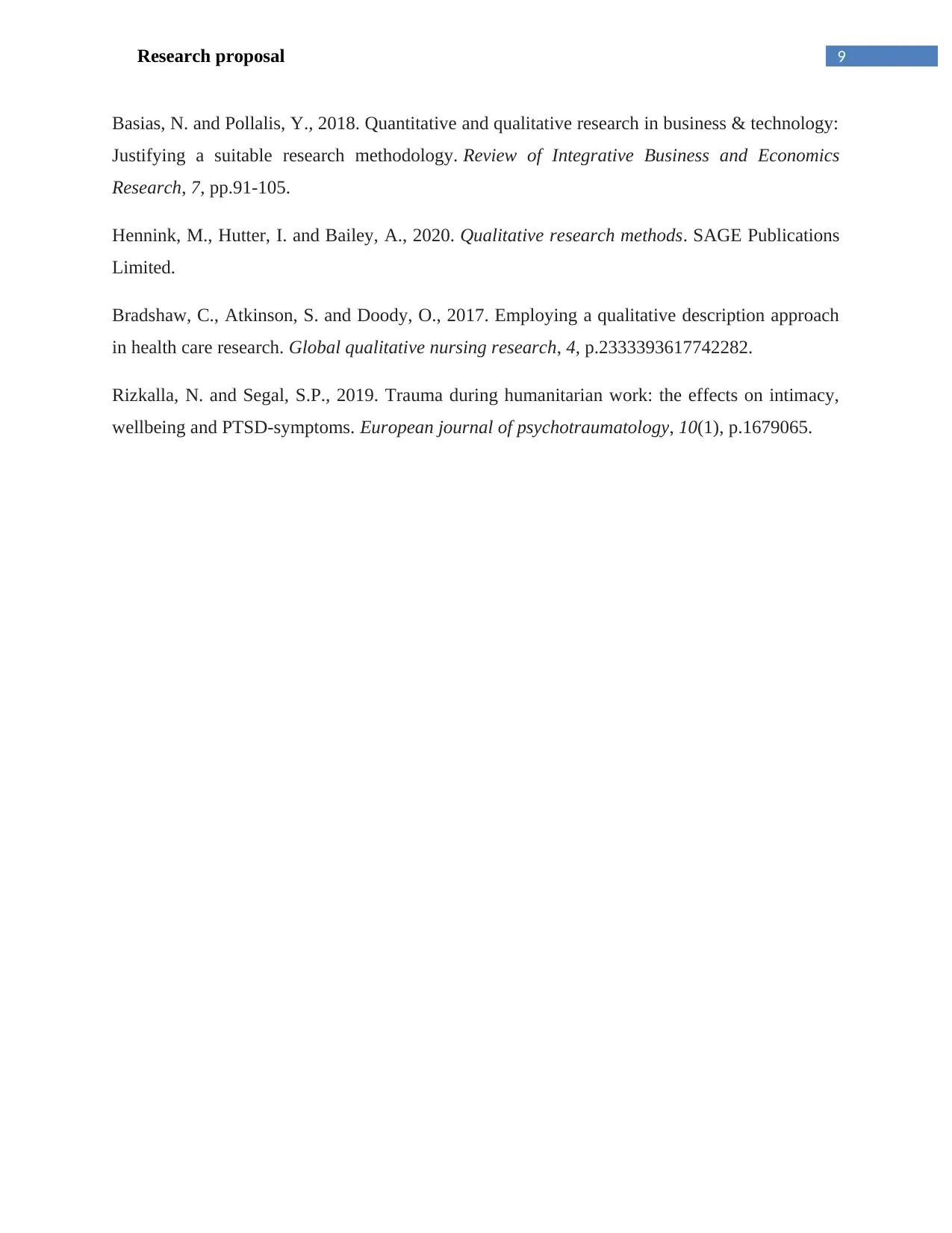
9Research proposal
Basias, N. and Pollalis, Y., 2018. Quantitative and qualitative research in business & technology:
Justifying a suitable research methodology. Review of Integrative Business and Economics
Research, 7, pp.91-105.
Hennink, M., Hutter, I. and Bailey, A., 2020. Qualitative research methods. SAGE Publications
Limited.
Bradshaw, C., Atkinson, S. and Doody, O., 2017. Employing a qualitative description approach
in health care research. Global qualitative nursing research, 4, p.2333393617742282.
Rizkalla, N. and Segal, S.P., 2019. Trauma during humanitarian work: the effects on intimacy,
wellbeing and PTSD-symptoms. European journal of psychotraumatology, 10(1), p.1679065.
Basias, N. and Pollalis, Y., 2018. Quantitative and qualitative research in business & technology:
Justifying a suitable research methodology. Review of Integrative Business and Economics
Research, 7, pp.91-105.
Hennink, M., Hutter, I. and Bailey, A., 2020. Qualitative research methods. SAGE Publications
Limited.
Bradshaw, C., Atkinson, S. and Doody, O., 2017. Employing a qualitative description approach
in health care research. Global qualitative nursing research, 4, p.2333393617742282.
Rizkalla, N. and Segal, S.P., 2019. Trauma during humanitarian work: the effects on intimacy,
wellbeing and PTSD-symptoms. European journal of psychotraumatology, 10(1), p.1679065.
1 out of 10
Related Documents
Your All-in-One AI-Powered Toolkit for Academic Success.
+13062052269
info@desklib.com
Available 24*7 on WhatsApp / Email
![[object Object]](/_next/static/media/star-bottom.7253800d.svg)
Unlock your academic potential
Copyright © 2020–2026 A2Z Services. All Rights Reserved. Developed and managed by ZUCOL.





